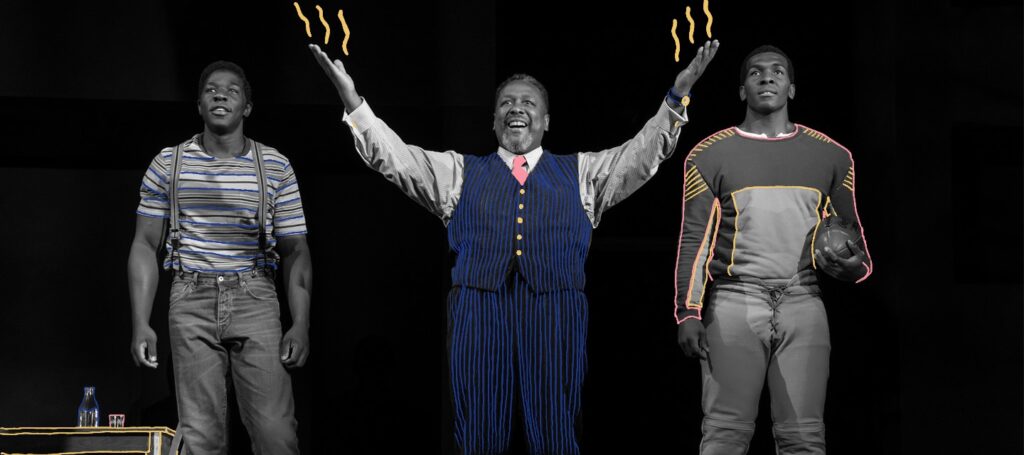


Is the American Dream Worth the ‘Death of a Salesman?’
Can you put a price tag on a life?
In America, it seems as though you must. In the land of dreams, everything you have and everything you are, is what you can sell.
Or at least that’s what’s been drilled into Willy Loman (Wendell Pierce), the protagonist of Arthur Miller’s seminal work Death of a Salesman, who, in the final days of his life, unravels under the weight of his own American dream: delicious, yet unattainable, like that carrot at the end of a stick.
Written and set in 1949, the play revolves around the aforementioned Willy, a lifelong salesman who resides in Brooklyn, NY, but regularly travels to the Northeast for work. After another day of making no sales, he returns home exhausted to his loyal wife Linda (Sharon D Clarke), who suggests that he asks his boss for a local position.
Willy’s sons, who happen to be visiting, don’t seem to hold their father to the level of esteem their mother expects. Biff (Khris Davis), the former golden boy turned arrested development, rejects the idea of pursuing success in business in favor of working outdoors, constantly disappointing Willy; and Happy (McKinley Belcher III), the restless second child who’s desperately seeking attention through his braggadocio, not unlike that of his father’s, is constantly dismissed as a womanizing nuisance.
But as the Lomans settle in for the night, albeit with lasting friction between father and sons, it becomes clear that Willy’s mind is bursting at the seams: the past begins to collapse into his present. This is represented by Anna Fleischle’s genius design which turns the set into an environment that’s both oppressive (with grey, almost brutalist, structures) and dynamic (moving doorways and suspended furniture that descends or levitates as needed), while Willy’s reality shifts around him, literally.
Here is a man who’s got a fire in his chest but is forced to be running on fumes. A man spinning faster than he’s allowed to. Pierce portrays this through energy that teeters delicately between despair and indestructible optimism, “riding on a smile and a shoeshine” to the last breath as a salesman’s meant to be.
English director Miranda Cromwell’s sleek approach to a quintessentially American classic breathes new life into the 71-year-old play. Telling Willy Loman’s story from the unique perspective of Black New Yorkers adds layers to the story that haven’t been explored before. “Be liked,” was Willy’s advice to his sons. “I am well-liked”, he boasts, as if that alone can guarantee the success he’s been so desperately reaching for.
Those words, spoken by a Black man who’s spent his whole life playing the corporate game in a White business world, carry extra weight because his family has a lot more to prove in a society that looks at them with scrutiny. You simply have to work a lot harder when working with, nay, against additional obstacles, such as racism and stereotypes.
Suddenly, it’s as if Willy Loman no longer lives in the 1940s but down the street in one of the ordinary houses in Crown Heights or Bedstuy. I watch as Willy Loman teaches his sons how to code switch in front of the White men in power, and ponder how far we’ve really grown as a society over the last 70 years.
Yet the Willy Lomans of our world are still sinking in quicksand because there’s a canyon of dissonance between their perceived self-worth (the “American Dream” that’s been sold to them at a discount but with a secret APR) and how they’re treated by a society that doesn’t care about their well-being. A society where they are not born with the privilege of drawing attention, but rather, have to earn it through a lifetime of “smile and shoeshine.” An image that takes a lifetime to cultivate, and only one mistake to destroy.
“Attention, attention must be finally paid to such a person,” Linda emphasizes when her sons dismiss their father. Clarke’s heartbreaking portrayal of the loving wife has Linda choosing to become an anchor in the storm that tries to uproot her husband, while providing him with an infinite amount of understanding. Willy and Linda’s is not an earth-shattering romance, but one of the most palpable, unyielding loves I’ve witnessed in dramatic storytelling.
The brilliantly crafted and performed production is an emotional rollercoaster that clutches your attention with ease despite its run time of over three hours. Besides Pierce and Clark, Belcher III makes a lasting impression with a nuanced portrayal of Happy Loman, the actor adds much depth and vulnerability to a character that could’ve been one-dimensional as you watch him put on the façade of a son who tries his hardest to impress his father to no avail. And there’s André De Shields (who must possess actual magic powers!) who effortlessly embodies Willy’s suave and glitzy brother Ben who made his fortune in the diamond mines of Africa.
Cromwell impresses with directorial ingenuity by juxtaposing Willy’s reality, presented in a dull, monochromatic scheme, against flashbacks featuring colorful costumes by Fleischle and Sarita Fellows. Jen Schriever’s lighting and Mikaal Sulaiman’s sound design enhance the surrealism in the memory scape.
I was also particularly delighted by the use of music in place of the voices of characters who are not present on stage. In one scene, a phone call has Linda alone on stage speaking into a receiver, while Biff’s shadow is projected onto the back wall and his responses represented by atonal jazz music (composed by Femi Temowo).
Whether Death of a Salesman is a text you’ve chewed through many times over or something you’re exposed to for the first time, this is an eye-opening revival. It puts the falsehood of the American dream on full display and calls to attention those who must do more to be liked, who must be the most prepared, the funniest, and the most impeccable at everything in order to prove their worth.
Willy’s neighbor Charley (Delaney Williams) puts it plainly, “The only thing you got in this world is what you can sell.” It’s the American faith to believe in that notion, and yet we also understand that the price tag we put on ourselves sometimes has a lot more to do with the color of our skin, and that it’s something preordained across generations. And yet, it is the American dream we continue selling and being sold. Indeed “attention must be paid”.
Keep Reading

This ‘1776’ Forgets the Very People It’s Claiming to Serve
The revival of 1776 – a musical about the all-male, all-white Founding Fathers signing the Declaration of Independence – which opens tonight at the American Airlines Theatre, begins with several women, trans, and nonbinary actors of various races and body types entering the stage in modern dress and putting on historical costumes. Among them is […]
Read More
The Gorgeous ‘Cost of Living’ Depicts Disability in Groundbreaking Ways
Last season, Martyna Majok stunned audiences with her gripping portrayal of immigrant life in Sanctuary City; now her earlier play, Cost of Living, which won the Pulitzer Prize for Drama in 2018, is making its Broadway debut–as is the playwright. Last year I extolled her work as “off-Broadway at its best,” and this year I […]
Read More












